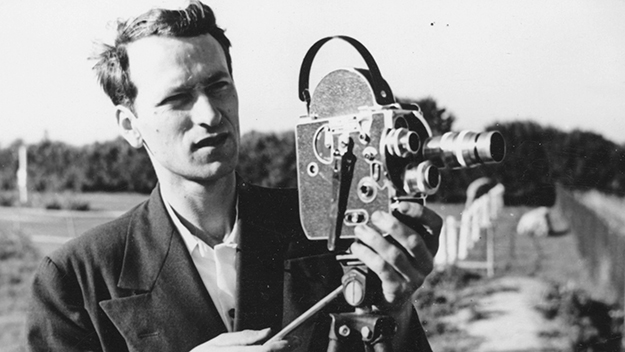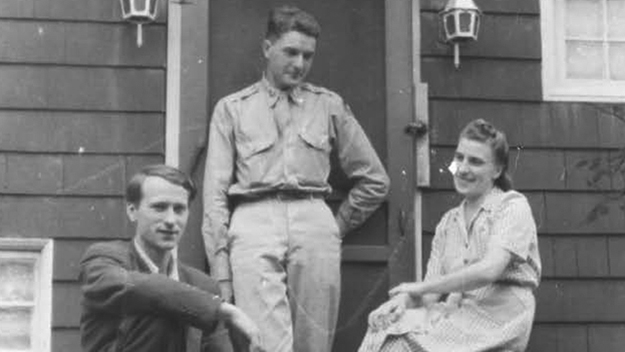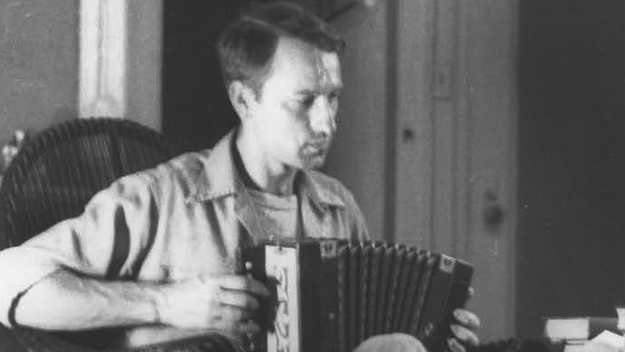Excerpt from I Seem to Live. The New York Diaries, vol. 1
 “Myself, 1950, with the first Bolex. It worked fine until 1958 when Ray Wisniewski, a good friend, borrowed it to film the demonstrators of a nuclear ship entering the New York harbor. During a skirmish with the police he dropped it into the ocean. Being a good swimmer, he managed to retrieve it, but it never worked well again. Around the year 1959 I bought the second Bolex.” Images courtesy of Spector Books.
“Myself, 1950, with the first Bolex. It worked fine until 1958 when Ray Wisniewski, a good friend, borrowed it to film the demonstrators of a nuclear ship entering the New York harbor. During a skirmish with the police he dropped it into the ocean. Being a good swimmer, he managed to retrieve it, but it never worked well again. Around the year 1959 I bought the second Bolex.” Images courtesy of Spector Books.
Published last year, Jonas Mekas: I Seem to Live. The New York Diaries, vol. 1, 1950-1969 picks up where Mekas’s revelatory memoir, I Had Nowhere to Go (1944–1955) left off. Starting in the ’50s, this volume spans the formative years of the artist’s career: his and his brother Adolfas’s arrival in New York, their first experiments with film, the founding of Film Culture magazine, the start of Mekas’s weekly column in The Village Voice, and more. A second volume, covering the years 1969 to 2004, is forthcoming.
Reprinted below with the kind permission of Spector Books is an excerpt from I Seem to Live, covering Mekas’s thoughtful and moving reflections on getting used to life as a Lithuanian immigrant in New York and scrounging together money to buy his and Adolfas’s first Bolex camera.
January 11, 1950
I seem to live on moods, ups and downs. And I seem to be repeating the same mistakes over and over again. Some mistakes are beautiful. There is a beauty in mistakes that you can’t find anywhere else, maybe that’s why. And I keep avoiding any definite ties with anything and anybody. There are places and moments during which I feel that I would like to always remain there. But no: next moment I am gone. I seem to enjoy only brief glimpses of intimacy, happiness. Short concentrated glimpses. I do not believe that they could be extended, prolonged. So I keep moving ahead, looking ahead for other moments. Is it in my nature or did the war do that to me? The question is: was I born a Displaced Person, or did the war make me into one? Displacement, as a way of living and thinking and feeling. Never home.
Always on the move.
February 18, 1950
I have been living all my life dreaming. Between me and the world there is always a space of un-reality. I don’t want—or maybe I don’t know how—to dissolve, to submerge into reality around me totally, unconditionally.
I see, I feel all the time this dream distance, as if I was from another century, maybe somebody who strayed away in time, from the times of Cervantes maybe. I am trying, with all that I know, to escape it, to throw myself desperately into the thick of dailyness, in order to feel “the blood of reality.” But I keep bouncing back, again and again, into the dreamland.
March 19, 1950
Films seen recently:
The Great Beginning
Panic
Nanook of the North
Louisiana Story
The Spanish Earth
Song of Ceylon
Window Cleaners
 “In Maspeth/Brooklyn, during one of Adolfas’ brief leaves from the U. S. Army.”
“In Maspeth/Brooklyn, during one of Adolfas’ brief leaves from the U. S. Army.”
March 25, 1950
Three weeks ago we put $150 deposit on a Bolex camera, at Peerless. We have to pay another $150. We could take the camera right now, but we need a guarantor.
At first we thought it will be easy to find a guarantor. But now three weeks have passed, and we are still looking for one. Today we gave up the idea of finding a guarantor; instead, we decided to borrow some money and pay.
We went to Tysliava, the publisher of a Lithuanian weekly paper in Williamsburg. But he didn’t show any enthusiasm for our dream. Instead, he gave us a long lecture on filmmaking. He said, “Ah, there is more to film than filming: there is also editing. And what do you know about that? Of course, I could guarantee it for you. But suppose you are killed by a car, or something—I’d have to pay for you, no?”
We left him, angry. We expected much more understanding from him. I don’t know why we did. I guess, it’s our foolish idealism. Anyway, all he did, he advised us to work in the factory.
So we went to the Lithuanian Catholic priest. He said, come tomorrow, the secretary will guarantee it for you. Next day we come—he is a mask. He says, I can’t help you, I have no money. So we say, no, we are not asking for money, we are asking for trust. So he says, he spoke with Tysliava, and Tysliava advised him: don’t do it, Mekas brothers are not practical, they are idealists, they do not know America— you’ll lose your shirt if you go with them.
So now we are walking through Brooklyn angry. Ah, not even the priests have faith anymore.
No date, 1950
When I stepped out, or rather stepped on this island, I still carried in my hair the winds of Lithuania and the winds of the years of wandering through Germany.
The winds of America? I am only beginning to perceive them, very barely. But I want to feel them deeply—to feel them, to live them. I want to experience America to its very bottom. Then I can continue further, to somewhere else…
My greatest pastime and entertainment and happiness these days is to walk through New York, for hours and hours I walk drinking it all in.
No date, 1950
I am looking at my fingers. During the last few weeks my nails broke out in white spots. And more are coming. I don’t know where my luck is stuck, but it’s not here. But my nerves are all here, stretched like strings. The other night I tried to sleep. I couldn’t. I was trembling all over, every atom in me. I wanted to get up, go somewhere, anywhere. But I was unable to even get up. So I just lay there staring at the room.
For a month or two I’ve been in peace. But now I have entered another of my recurring periods of depression. I keep trying to persuade myself that this is only temporary, “this happens only during the rain periods.” But that doesn’t answer all the questions.
Now that we both, Adolfas and myself, have been firmly branded by Lithuanians as communists—any meeting, any time spent with them is only a further wrecking of nerves. The family of Prof. Berentas and Algis are about the only Lithuanians we still see.
 “I always had a boyan. I never learned to play it, but I always played anyway. My brother Kostas played violin, had a band for some time. Petras played organ and accordion quite well. And my father was known for fixing musical instruments, he was born a carpenter but ended up as a farmer. But he never quit carpentry.”
“I always had a boyan. I never learned to play it, but I always played anyway. My brother Kostas played violin, had a band for some time. Petras played organ and accordion quite well. And my father was known for fixing musical instruments, he was born a carpenter but ended up as a farmer. But he never quit carpentry.”
No date, 1950
I look at these people and I am terrified. And I ask myself: Do I really want to be like everybody else? Do I really want to belong to this kind of world? Here are the everybodies. But are they happy? Do they feel happy, these Jedermanns? Maybe they are living in pain, inside. It’s like when you really suffer, inside, you become oblivious to it, you live like a somnambulist: just like these people now on these benches this Sunday afternoon.
On our way here, to the park, we crossed Fifth Avenue and it was full of a different life… All the cars… Ah, they, too, every weekend they are driving their big cars same way, going to the same beaches for maybe thirty years, and they’ll bake in the sun (they have to look tanned!). Yes, they like to have certain regular places where they can always go, like all animals do, all animals attach themselves to a place, to a habitat. They’ll drink beer, “Coca-Cola” maybe, and will munch on crackers, will wade into the water, and they’ll talk the same talks, and then they may go to some dancing somewhere, and then maybe this and maybe that. Then Monday will be here and they’ll all go to work, the same work, the same faces, every week, every month, every year.
Ah, yes, they have memories, reminiscences—driving a car, going to the beach, drinking “Coca-Cola” etc. etc.—and the memories of one of them could be easily exchanged with those of any other—they are all alike—their lives are alike—one or two love adventures, maybe one secret (wife doesn’t know it yet, not yet), a trip to Florida, etc.
Ah, I thought, it’s good that I fall into those ravines of desperation—they open me to the other, different reality which I otherwise wouldn’t see. Desperation, pain—ah, I can profit from them all.
Excerpt taken from: Jonas Mekas: I Seem to Live. The New York Diaries, vol. 1, 1950-1969, published by Spector Books, 2019







